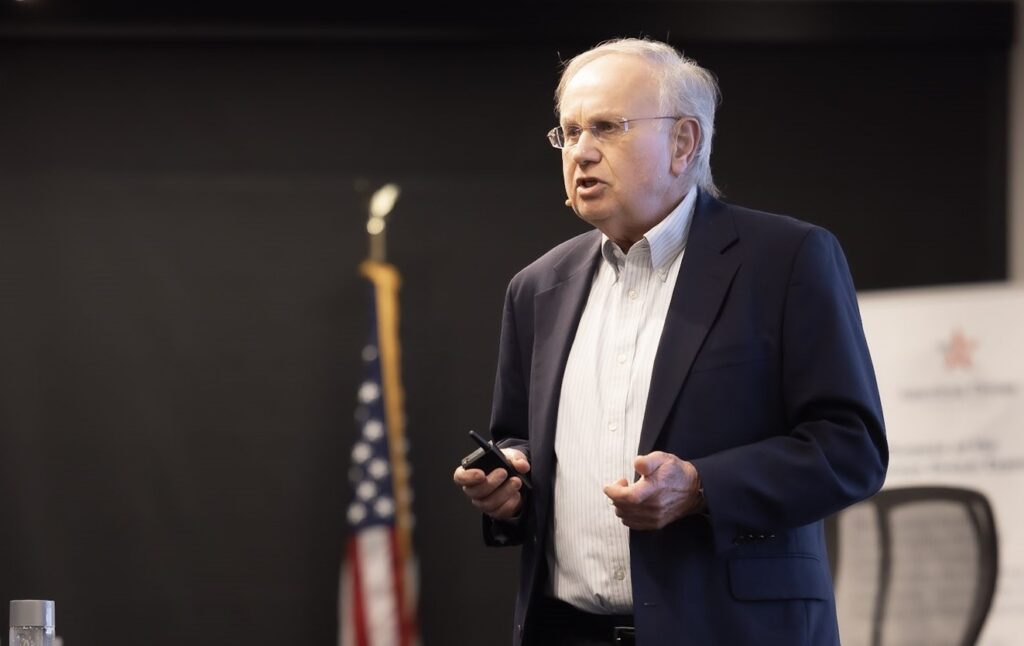
When it comes to your hard-earned money, we believe investors should take a holistic and scientific approach. For more than 30 years, Matson Money has worked with top economists and behavioral scientists to develop portfolios based on empirically tested academic research.
Each year, Matson Money hosts the Advanced Advisor Conference, where advisors have an opportunity to hear from industry professionals in the fields of economics, data science, human performance, and more. This year, advisors took a deep dive into the science of investing and how it can transform investors’ relationship to money.
“In the same way that physicians promote both health and well-being, financial advisors promote wealth and well-being,” said Meir Statman, Ph.D., while sharing at this year’s Advanced Advisor Conference. “They’re not wealth managers, they are well-being managers.”
Dr. Statman is a member of Matson Money’s Academic Advisory Board; His work is dedicated to understanding how investors make decisions and how their decisions are reflected in financial markets. “Behavioral finance attempts to describe the investment choices we humans make,” writes Statman in his published article Financial Physicians.1 “We are neither irrational nor rational. We are normal-intelligent, but fallible. We have brains, not computers, in our heads.”
Because of this, investors can be vulnerable to biases, emotions, and other internal and external forces influencing their investment philosophy.
“It is not enough to know the science of investments,” Statman said. “You also must know and apply the science of investors.” To do this effectively, Statman suggests that advisors should take on the role of a financial physician.
“Financial advisors’ responsibilities to their clients goes beyond finances,” he said. “It is family, friends, health, work, and values – you need money for all of these, but money itself is not sufficient. So, you must become a financial physician – someone who asks, who truly listens, and who empathizes with peoples’ goals and fears. Financial advisors should listen, diagnose, educate, and then treat.”
Listen. Like a patient trusts a good physician, so must a financial advisor gain the confidence of an investor. Through the genuine listening of an investor’s aspirations, fears, and thoughts, an advisor can begin to understand the human behavioral dimension of investing and gain the trust of their clients. “Trusting investors are honest investors,” says Statman.
At Matson Money, we begin the advisor-investor relationship by establishing a foundation of trust and transparency. This starts with investors going through the 20 Must-Answer Questions for Your Journey Toward Investing Peace of Mind. Through this intake process, advisors can learn their clients’ past, financial health, and goals for the future.
Diagnose. With honesty comes an opportunity for accurate diagnosis. Just as a physician diagnoses a patient’s medical condition by conducting an examination and asking questions, a financial advisor diagnoses a client’s financial situation by analyzing their financial records and asking questions about their investing goals, risk tolerance, and preferences.
To help advisors accurately understand their clients’ investing health, Matson Money developed the Portfolio MRI®, a diagnostic measure for current investment information. The purpose of the personalized Portfolio MRI® is to help investors understand how various mixes or styles of investment portfolios may have performed in the past. The Portfolio MRI® is two-fold; it attempts to estimate, via broad based asset category selection, the current mix of a client’s portfolio and simulate the mix’s historical risk and reward characteristics and it allows investors to compare the risks versus reward characteristics of their portfolio against those of broadly diversified sample asset mixes.2
Educate. No matter the prognosis, there is an opportunity to learn and move toward a healthier future. We believe it begins with education. At Matson Money, we are committed to helping investors understand what they are doing with their money, and why, and choose an investment strategy that aligns with their goals.
To help investors do this, Mark Matson, Founder and CEO of Matson Money, developed the American Dream Experience, a two-day educational event that makes Nobel Prize-winning investing principles available to families everywhere. This is an opportunity for families to discover the tools and resources available to help create a battle plan that champions their dreams.
Treat. Both physicians and financial advisors are responsible for generating treatment plans that meet the needs of those they serve. Depending on the severity of the diagnosis, a physician may recommend anything from lifestyle changes to a strict medical regime. Similarly, a financial advisor can assess the situation and help investors make an informed decision based on their desired outcome.
While an initial game-plan for survival can be critical, it is also important to approach investing with the long-term in mind. “Invest for the next 20 years, not the next 20 minutes,” says Matson. Ongoing monitoring is crucial for the longevity of investors. Investors should meet with their advisors to assess their progress and make any adjustments to their investing approach as needed.
“Many investors want more than a balance of risk or return or more than simply enough money for a secure retirement and college education for their children,” said Statman.1
“Financial advisors who act as financial physicians combine the science of finance and securities with the ability to empathize with and guide clients-thinking not about risk and return but about investors’ fears, aspirations, and the errors they are likely to make.”1
Don’t go on this journey alone and self-diagnose your portfolio, your financial future may depend on it. If you are interested in learning more about your financial health and how the science of investing can help transform your relationship to money by attending the American Dream Experience, you can learn more and register here.
1. Statman, Meir. Financial Physicians. AIMR Conference Proceedings. August 2022. Retrieved from https://www.researchgate.net/publication/240304497_Financial_Physicians
2. “Determinants of Portfolio Performance,” Financial Analysts Journal, Gary P. Brinson, L. Randolf Hood, and Gilbert L. Beebower, 1986, 1990, 1991. (Referred to throughout as Brinson, Hood & Beebower)
DISCLOSURES:
This content is based on the views of Matson Money, Inc. This content is not to be considered investment advice and is not to be relied upon as the basis for entering into any transaction or advisory relationship or making any investment decision.
This content includes the opinions, beliefs, or viewpoints of Matson Money. All of Matson Money’s advisory services are marketed almost exclusively by either Solicitors or Co-Advisors. Both Co-Advisors and Solicitors are independent contractors, not employees or agents of Matson.
Other financial organizations may analyze investments and take a different approach to investing than that of Matson Money. All investing involves risks and costs. No investment strategy (including asset allocation and diversification strategies) can ensure peace of mind, guarantee profit, or protect against loss.
PAST PERFORMANCE IS NO GUARANTEE OF FUTURE RESULTS
Academic Advisory Board members receive compensation from Matson Money for their services which include, but are not limited to, independent leadership consulting; co-authoring white papers; and speaking at Matson Money conferences. Advisory Board members may also provide insight to Matson Money on portfolio construction, asset allocation, quantitative analysis, investor behavior and other areas of expertise, as needed.




